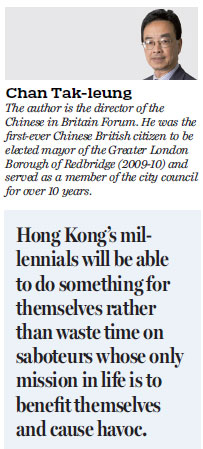HK's young people need independent thinking
Updated: 2017-05-26 07:59
(HK Edition)
|
|||||||
Chan Tak-leung says the millennials face many real problems but risk sleep-walking to disaster; they should not be ignored
'Generation Y" or "millennials" are terms commonly used to refer to young people born between the 1980s and early 2000s. In Hong Kong, this year's mid-year projection of the total number of residents between the ages of 15 and 34 is 1.85 million or 25 percent of the estimated population of 7.2 million. Promoting their aspirations, motivations and well-being should therefore merit not only concern but also prompt action by the incoming administration to ensure they can capitalize on the freedom and democracy they enjoy while building a stable and prosperous future for themselves and for Hong Kong as a whole.
Looking around globally, millennials might have different characteristics because of variations in social and economic conditions. However, they share some traits regardless of their diverse ethnic, cultural, historical, social and linguistic backgrounds.
For Hong Kong's millennials, advances in digital technologies and the vast amount of junk and biased information pumped into their heads throughout their formative years would cloud their ability to reason and rationalize what they should do in order to achieve something for themselves either in their studies or at work. There are positive role models but most millennials might feel they are stuck in a life of mediocrity with no breathing space and nowhere to go.

Some might find it difficult when faced with bullying, stress, depression and failure to compete with others. They do not know how, or are not confident enough, to share their troubles with anyone; pressures are so acute that some of them might have to resort to self-harm or even commit suicide. In recent years, the misinformation and heated debates for more freedom, democracy, self-rule and even denying their Chinese identity by a small group of activists would be confusing even for grown-ups. Their frequent use of various social media platforms on the one hand and the feeling of not able to communicate either with their peers or parents may eventually lead them to condone or even take part in illegal and criminal activities. In the short term, these engagements might act as an escape route for them but will lead them nowhere.
These acts of delusive escapism among the increasing number of Hong Kong's millennials must be recognized and addressed without delay.
One would go even further to suggest the way some millennials in Hong Kong behave was also probably the result of the emergence of a myriad of social issues that need immediate fixing and resolving. These may range from the home environment to education, housing to jobs, pressures from peers to other factors of influence.
What are the chances that they can come out from all these influences unscathed? How are they able to make rational judgements when there is so much misinformation surrounding them? How to seek hope, stability and better prospects for themselves when there are so many doom-merchants out there to drag them down?
Challenges and adversities are of course not something unique to Hong Kong. Young Britons face a myriad of social, economic and political problems. One only hopes that the result of the general election next month will provide the stability millennials in Britain would need to move forward.
As for Hong Kong, one believes the administration must take immediate and comprehensive measures to improve the learning environment for its youthful citizens. First and foremost, there is a need to improve their communication skills, a need to discuss with them about their rights and responsibilities as citizens and to help them to grow their ability to think independently and to make their own judgments - rather than being swayed and confused by incessant and biased misinformation being pumped out in various social media platforms.
In schools, the principles of a civil society must be explained unequivocally to ensure millennials will develop into responsible citizens, respecting one another and above all, respecting the rule of law. They must be encouraged to undertake voluntary service and help others less fortunate than themselves. As for those who are at work or looking for work, better awareness of Hong Kong's geopolitical position and its associated benefits will surely let them externalize their visions and encourage them to seize the many global opportunities awaiting them.
Under the "One Country, Two Systems" principle and the Basic Law, the future of the special administrative region is indisputable. With the ability to think independently, Hong Kong's millennials will be able to do something for themselves rather than waste time on saboteurs whose only mission in life is to benefit themselves and cause havoc.
(HK Edition 05/26/2017 page1)